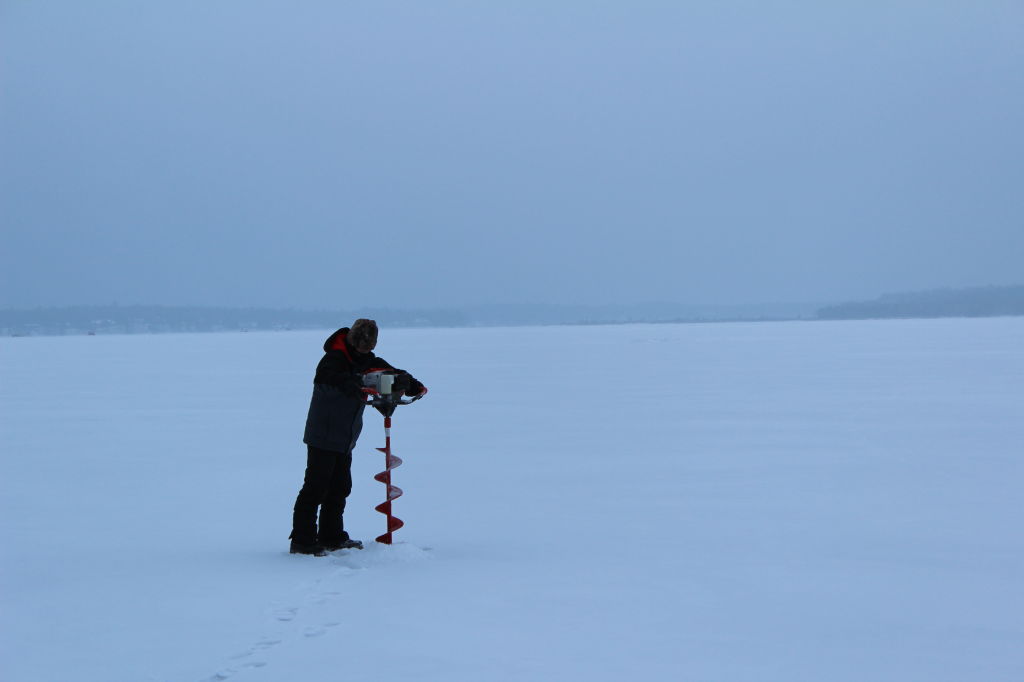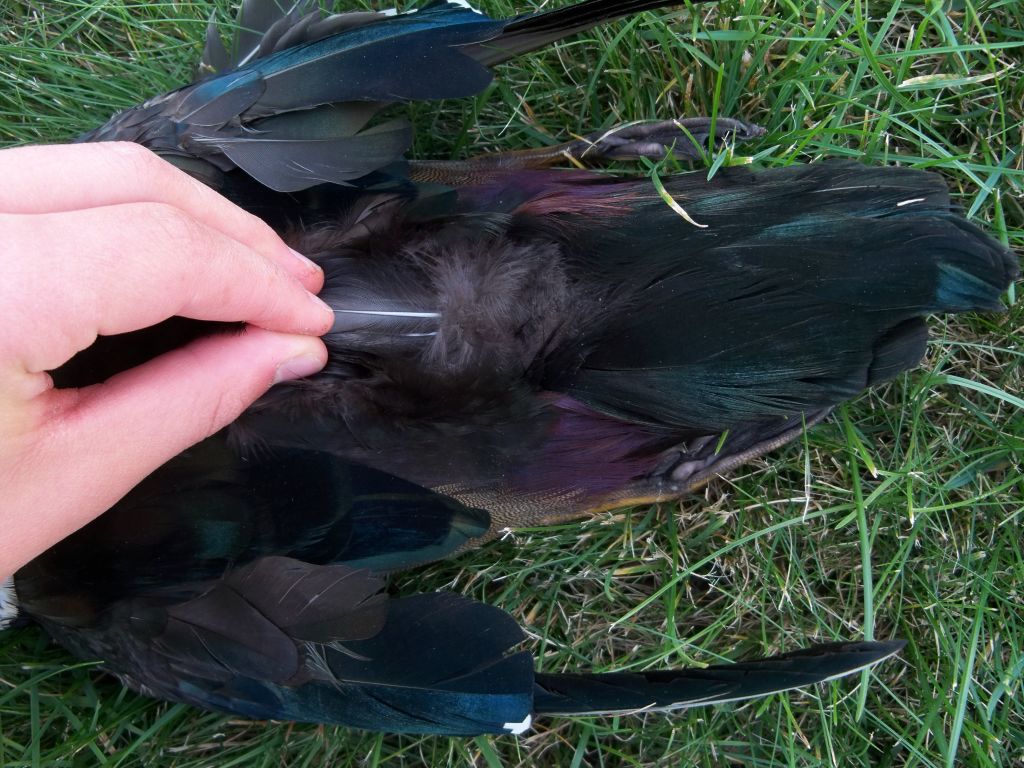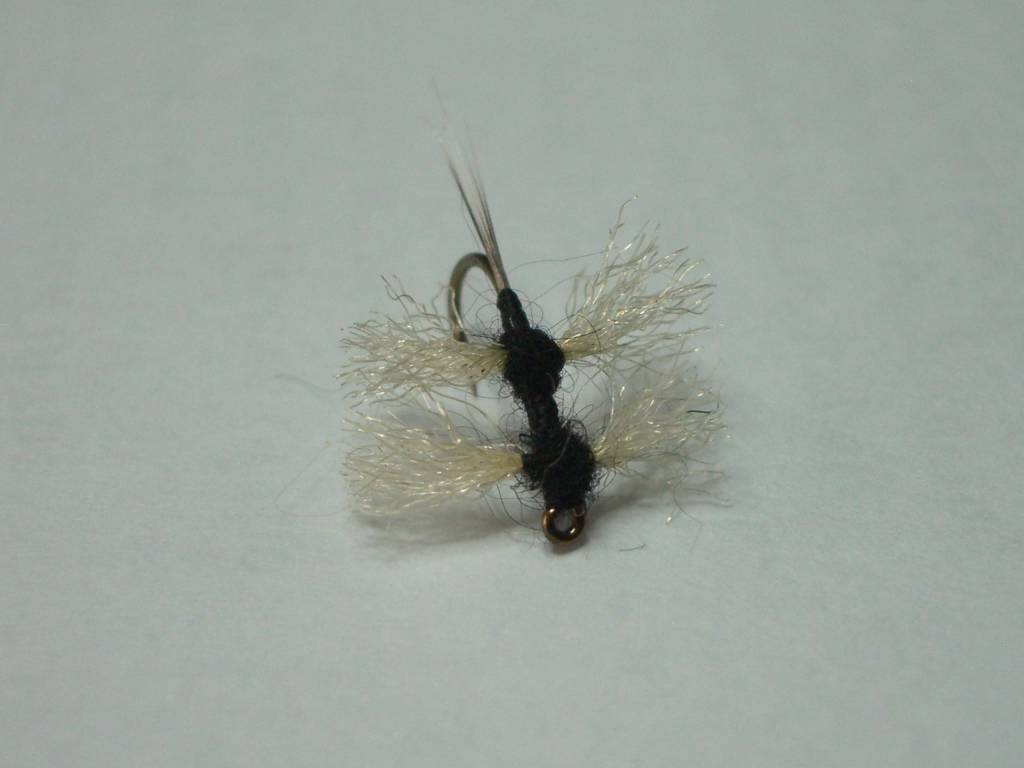Tying Ice Flies for Winter Panfish
Tight lining has taken the panfish ice fishing scene by storm in the past few years, and for good reason. This highly productive technique utilizes ultra-quick sinking tungsten jigs in combination with realistic, imitative ice flies on the same line. I’ve been tying, testing, and tweaking the design of a few ice flies over the past two seasons with great results on the ice. Here are two of my most productive patterns for hardwater panfish. Hook: #12-16 heavy wire nymph hook Bead:5/32″ brass bead Thread: Black 8/0 Tail: Natural gray chickabou with one to two strands of gold flashabou on either side Body: Brown micro tubing Legs: Brown x-small or micro barred rubber legs Thorax: Dubbing blend of your natural dubbing (hare’s ear, squirrel, etc.) and gray or olive UV Ice Dub Get some hand-tied Slab Spikes in our shop! Hook: #12-16 heavy wire nymph hook Bead/Eyes: 5/32″ brass bead…
bluegill ice flies crappie ice flies fly tying ice fishing ice flies ice flies for panfish ice fly patterns Slab Spike tight lining ice flies tying ice flies
The Simple Scud
Here is a quick little scud pattern to add to your trout box. Scuds are an important food source for trout in nutrient-rich spring creeks and tailwaters year- round. This fly fishes equally well in rivers and lakes. Drop it off a beadhead in an indicator rig or strip it in around the weed beds. The simple scud uses just a few materials and is very easy to tie. For me, the simple scud is more of a style of fly than an exact pattern. Don’t be afraid to experiment and change it up. For this fly, I used a standard straight Mustad Signature Series Nymph hook (mostly because I don’t have any scud hooks:)), which works just fine. My favorite dubbing blend is a mix of hare’s ear, antron, and Ice Dub, but scud dub, Ice Dub, and antron are all good substitutions. The scruffier the better, so don’t…
Smoky Mountains Fly Tying Jam
The first couple days of our trip out to the Smokies in late October were shut out due to some rainy, cold conditions. The hurricane pushed a huge cold front through the mountains, dumping over three feet of snow in the higher elevations! Newfound Gap Road, which cuts through the mountains, was closed for most of the first two days. All that was left to do fishing-wise was to sit down and crank out a bunch of flies. That’s exactly what we did. First on the menu were some tungsten hare and coppers tied with lemon wood duck flank from a wood duck I shot in September. I always keep a good stock of these in my box, as they work well pretty much anywhere and are quick and easy to tie. The tungsten version worked great to get down to the fish in the cold. Next, I whipped up…
chocolate greedo nymph fly tying GSMNP prince nymph Smoky Mountains
DIY Fly Fishing: How to find CDC feathers on a duck
Duck season is in full swing in many parts of the country right now. Hunting has slowed down here in Minnesota, but I had a pretty good season and bagged a couple ducks. A nice collection of CDC from mallards, wood duck, and teal is sitting on my tying bench, ready for the long winter. CDC is pretty quick and easy to grab off a bird, and is an outstanding feather for dry flies. Cul De Canard (or CDC) is one of the best feathers on a duck for fly tiers. It is found near the duck’s preen (urogypial) gland, which releases oils that a duck uses to help waterproof his feathers. Contrary to popular belief, CDC gets its great natural flotation properties primarily from the structure of the feather, not the oils. Micro-barbules extend from the fibers of the CDC feather, increasing surface area and trapping tiny air bubbles…
cdc cdc dry flies cdc duck feathers cul de canard DIY fly fishing fly tying how to find cdc feathers on a duck tying with cdc where to find cdc feathers on a duck
Tricos- Four Patterns to Fish the White Winged Curse
Over the winter I have been tying a bunch of trico patterns to get ready for summer fishing. If you have ever fished this hatch you know how challenging and fun it can be. These guys can be just maddeningly difficult, but they bring up lots of trout. Tippet down to 7X and a precise drag free drift are a must. Tricos usually emerge (very) early in the morning from July to September. Here are four patterns to fish the “white winged curse”. Trico Spinner I like to throw my spinners about 10-12 inches off the bend of a big bushy dry fly for better visibility. An Ausable Bomber works great for this. For a female spinner, use light olive thread. Hook: #20-24 dry Thread: Black 8/0 UNI Tail: Microfibbets or grizzly hackle fibers, splayed Abdomen: Thread Wing: White or cream Antron yarn Thorax: Black superfine dubbing Double Trico Spinner…
cdc trico pattern double trico spinner pattern fly patterns for the trico hatch fly tying sunk trico spinner pattern trico fly tying trico patterns trico spinners tricos



